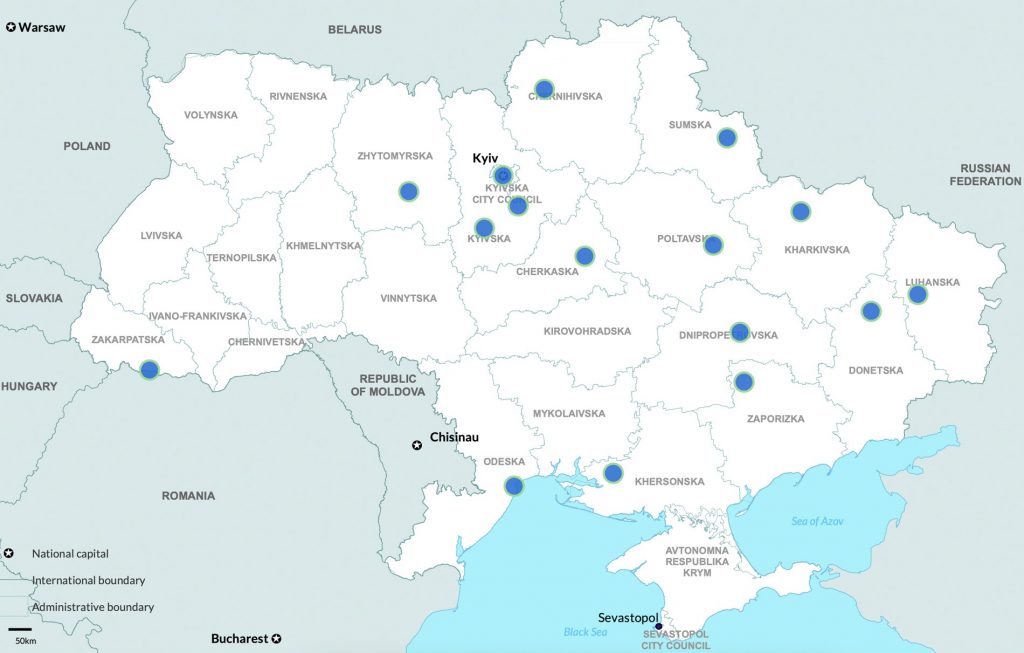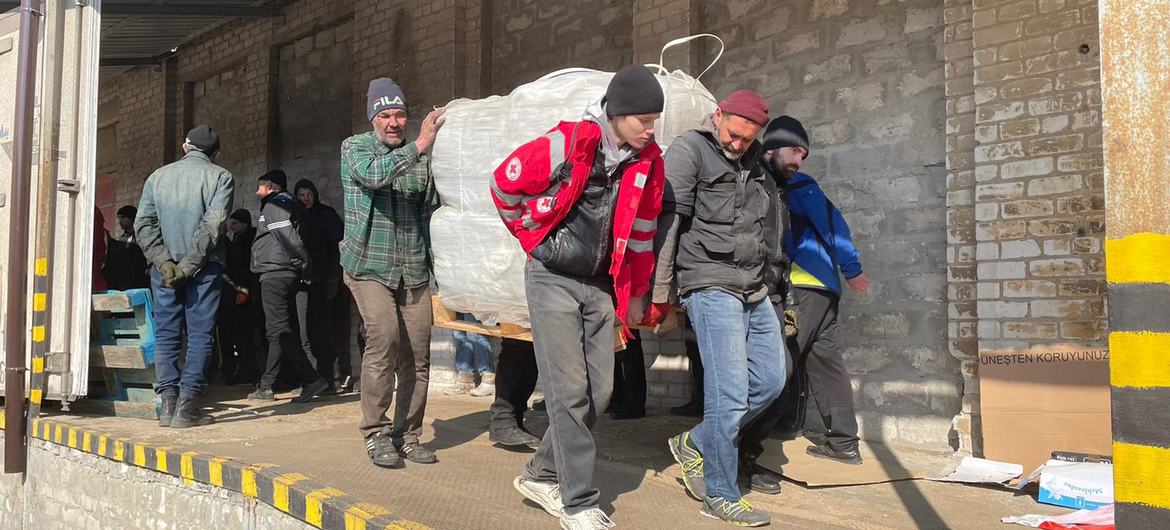With her husband’s dependence on cancer treatments, the war is the worst thing that could have happened to Bucha resident Halyna Opalat.
“He needs to be on an IV, but we weren’t able to make it to Kyiv,” said the 69-year-old, whose travel was blocked by Russians, then by temporary restrictions after Ukrainian victory here. “The nurse used to give him injections, but she escaped and now there’s no one left.”
Opalat’s husband is one of countless Ukrainians whose healthcare was thrown into chaos. With Russian attack axes cutting supply lines or trapping civilians, many Ukrainians with chronic conditions were left without critical drugs for weeks. Others were forced into unhygienic cramped shelters, in the cold, without enough food, in the middle of a COVID wave.
“This war has a huge impact on the health of people,” said World Health Organization country representative Jarno Habicht.
However, thanks to the work of international organizations, volunteers on the ground and the health ministry all working together, access to care is improving across much of Ukraine.
Habicht spoke to the Kyiv Independent in the afternoon on April 1, an hour after an aid convoy entered the embattled city of Sumy, with the WHO’s support.
The convoy contained multiple trauma kits. Each one has enough supplies to operate on 150 people. It also contained several interagency kits, each having enough medication and supplies to provide primary care to 15,000 people.
More recently, on April 5, a UN convoy has reached the city of Sievierodonetsk, where intense fighting has left residents without access to electricity, gas or clean water, as well as other basic necessities. The convoy brought food rations, flour, plastic sheeting and blankets for some 17,000 people, as well as four electricity generators for use by the local hospital.
Previously, aid convoys also reached Kherson, Kharkiv and Chernihiv, Habicht said. However, the besieged and largely destroyed city of Mariupol remains beyond the reach of aid convoys for now.
Habicht said coordinating the aid and trying to ensure it’s allowed through is a ‘round-the-clock process that never stops. Russian forces often block humanitarian convoys or make it too dangerous for them to travel by shelling areas.
“We’ve brought some of the best brains of the WHO to Ukraine in past weeks, from Afghanistan and from the (WHO) headquarters to support Ukraine and to ensure supplies can reach hospitals,” said Habicht.
Convoys are put together by many different organizations and depend on the work of volunteers.
"The volunteer drivers who deliver supplies are real heroes,” said Inna Ivanenko, director of the health NGO Patients of Ukraine that organizes humanitarian aid.

Russia’s war substantially rewrote the reality of Ukraine’s healthcare infrastructure.
According to the Health Ministry's comments to the Kyiv Independent, Russian forces damaged 279 medical institutions, fully destroying 19 of them. They are known to be specifically targeting hospitals, like in Mariupol, where Russian air forces bombed a maternity hospital on March 9, killing four people, including one pregnant woman with her unborn child.
Russian forces also shot 70 ambulances and seized another 104. They also besieged and occupied cities and towns, destroyed infrastructure and cut off transportation.
According to Habicht, about half of Ukraine’s 22,000 pharmacies closed due to the invasion, although the Health Ministry said this week that 80% of pharmacies in the country are now open again.
Fighting, shelling, internal displacement and Russian checkpoints disrupted people’s ability to pick up drugs, see their doctors and visit clinics and hospitals, many of which continue to operate around the clock, with doctors, nurses and other staff sacrificing their time and safety to provide treatments.
The war also created shortages of non-infectious and chronic care medicines, Habicht said. Conditions that require regular care include diabetes, cancer, hypertension and others.
"In the first weeks of the war, there was a very drastic situation with insulin," said Ivanenko, "This also affected two hormonal drugs for treating the thyroid."
“But volunteers helped and a lot of humanitarian insulin came… and now the situation with insulin is more or less normal,” she said. “There were gaps but the situation is improving.”
“The anti-retroviral situation is also improving,” Habicht added. “Anti-tetanus vaccines have been delivered to the public health authorities in the past week. So from that angle, even if there were gaps, they are gradually getting filled.”
The bigger problem is oncology care, said Ivanenko. While many oncology drugs have been procured and are sitting in warehouses, moving them to where people need them is a challenge, leading to shortages.
The Health Ministry wrote that it’s taking “maximum effort” to ensure children with cancer are able to get treatment in safer parts of Ukraine or continue treatment abroad, in the EU. Over 400 children are now getting free oncology care in other countries.
But communicable diseases are a risk as well, especially with so many people fleeing for their lives – Habicht said it’s going to be an “enormous stress test” for the health system.
Tuberculosis has been a constant problem in Ukraine and it may get worse. While Ivanenko said there wasn’t a disruption in access to TB drugs because they had been procured and delivered, a new outbreak of the respiratory disease may be coming.
“People spent a lot of time in cold basements in unsanitary conditions,” she said. “We predict there will be a new spark of TB and maybe multi-drug resistant TB.”
The other major respiratory illness is COVID. The Health Ministry reported that on April 5, 2,161 new daily infections were recorded, down from a peak of 39,620 confirmed cases on February 3, according to the WHO.
Habicht said that before the war, Ukraine saw a plateau in its omicron variant wave. Since then, the number of cases has decreased.
"But we must realize that the monitoring system is currently also disrupted,” he said. “Many private labs are not doing COVID tests and public labs are also testing for other needs, not just COVID. So when we see 2,000-3,000 new cases every day, I would say it is underreported."
Health officials, Ukrainian nonprofits, volunteers and international organizations are doing their best to both deliver supplies to areas where they’re needed, as well as parts of Ukraine that saw an influx of displaced evacuees.
“Displaced people may have left home with one bag and no medicines so in western and central Ukraine, it’s very important to ensure care can continue and medications are available,” Habicht said.
The Health Ministry said it’s doing “everything possible and impossible” to ensure treatment is available and that patients needing consultation "should turn to medical institutions in the safer regions of the country."
The ministry collected over 3,189 tons of drugs, equipment and medical supplies worth Hr 3.2 billion. This week, 13 tons of medication for chronic diseases worth $20 million was delivered thanks to the Heart to Heart Initiative and HOPE Worldwide.
The ministry is also boosting support for pharmacies while trying to ensure drug prices do not spike at a critical time.
Still, the far reaching health impacts of the war will require a lot more work to mitigate.
“What we see is actually people have lots more conditions,” said Habicht. “Many have delayed their care. Also, because of being on the move, they have malnutrition and we are seeing the impacts of that. Many women are delivering early.”
"Because it’s only five weeks, (the full impact of the war) is difficult to describe. We potentially have impacts for years and a (psychological) impact for generations."













